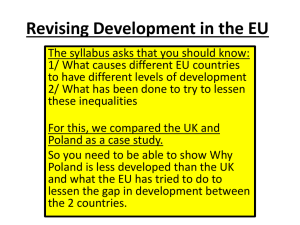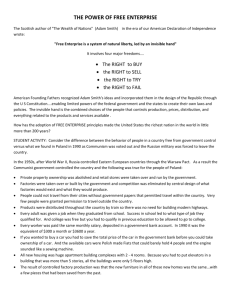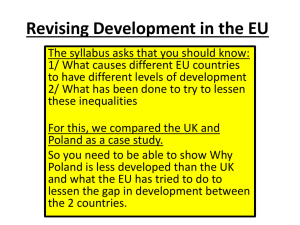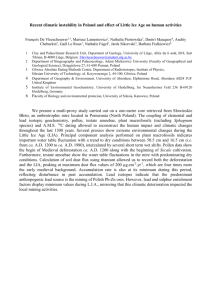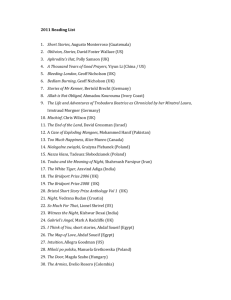Friction-psychological, sociological, political
advertisement
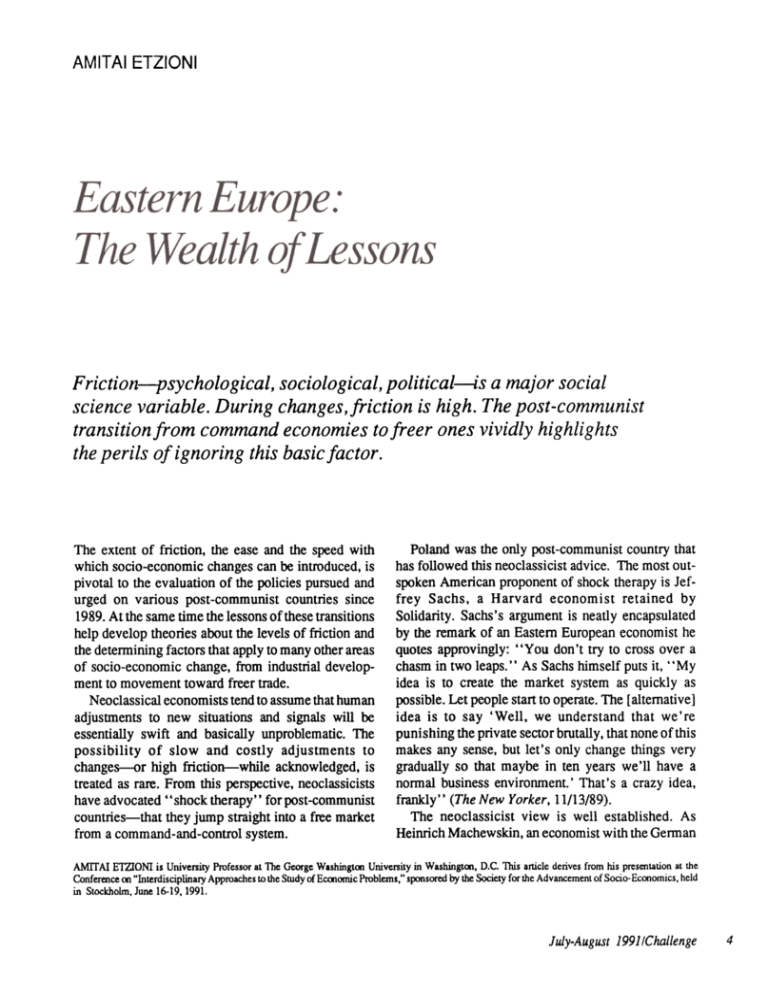
AMITAI
July-August
ETZIONI
Friction-psychological,
sociological, political-is
a major social
science variable. During changes,friction is high. The post-communist
transition from command economies to freer ones vividly highlights
the perils of ignoring this basic factor.
The extent of friction, the ease and the speed with
which socio-economicchangescan be introduced,is
pivotal to the evaluation of the policies pursuedand
urged on various post-communist countries since
1989.At the sametime the lessonsof thesetransitions
help developtheories aboutthe levels of friction and
the determining factors that applyto many otherareas
of socio-economicchange, from industrial developmentto movementtoward freer trade.
Neoclassicaleconomiststendto assumethathuman
adjustmentsto new situations and signals will be
essentially swift and basically unproblematic. The
possibility of slow and costly adjustments to
changes-or high friction-while acknowledged,is
treated as rare. From this perspective,neoclassicists
haveadvocated"shocktherapy" for post-communist
countries-that they jump straight into a free market
from a command-and-controlsystem.
Poland was the only post-communistcountry that
hasfollowed this neoclassicistadvice. The mostoutspokenAmerican proponentof shock therapyis Jeffrey Sachs, a Harvard economist retained by
Solidarity. Sachs's argumentis neatly encapsulated
by the remark of an EasternEuropeaneconomisthe
quotesapprovingly: "You don't try to cross over a
chasmin two leaps." As Sachshimself puts it, "My
idea is to create the market system as quickly as
possible.Let people startto operate.The [alternative]
idea is to say 'Well, we understand that we're
punishing the private sectorbrutally, that noneof this
makes any sense,but let's only change things very
gradually so that maybe in ten years we'll have a
normal businessenvironment.' That's a crazy idea,
frankly" (TheNew Yorker, 11/13/89).
The neoclassicist view is well established. As
Heinrich Machewskin,an economistwith the German
AMrrAI ETZlONI is University Professorat The GeorgeWashingtooUniversity in Washingtoo,D.C. This article derivesfrom his presentationat the
Conference00 "hlterdisciplinary Approachesto the Studyof EcooomicProblems,"sponsoredby the Societyfor the Advancementof Socio-Economics,held
in Stockholm,June16-19,1991.
19911Challenge
4
Institute for the Economy in Berlin, stated (TheNew
York Times,11/10/90), "The economictextbookssay
such a program is to be preferred to a step-by-step
program." Expertslike Gary Beckerof the University
of Chicago attest that "the duration of the pain [of
transition] canbe reducedandbenefitsincreasedif the
essentials of a market systemare quickly put into
place. ...Land, housing, retail establishments,and
many services can become private property right
away. ...It
would even be technically possible to
privatize many large factories quickly" (Business
Week,11/24/90).
Illusions of low friction transition
Almost a year ago I predicted that the transition would
either be slowed down or repudiated (The New York
Times. 6/17190). That prediction was based on obselVing specific socio-economic factors that suggested that
the friction level of transition would be high, and therefore attempts to move rapidly would generatestressthat
could not be overcome (at least within a democratic
framework). The first sign that this seemsto be a valid
prediction might be seen in the results of Poland's
November 1990 elections. A Washington Post headline
(11{l.7/90) read" Mazowiecki Steps Down as Premier:
Government Policies Seen as Repudiated by Polish
Electorate.' ,
Neoclassical economists tend to assume that people
are the same in all societies, cultures, and historical
situations: All people are rationally seeking to maximize their self-interest. According to neoclassicists, in
communist societies people are only held back by overbearing statist institutions. Scrapping those will free
their entrepreneurial spirit and lead in short order to a
free economy.
Building on these assumptions, which were further
backed up by pressure from international institutions
(such as the International Monetary Fund and the World
Bank) as well as the U.S. State ~partment and some
American banks and private investors, Poland in 1990
slashed government subsidies, made the zloty convertible, closed or privatized a number of state enterprises,
allowed freedom of labor mobility, and otherwise made
room for the market-basedallocation of resources.It was
assumed that as resourceswere freed from statecontrol
(' 'privatized' '), the market would deliver them where
they would be used most effectively.
For a short transition period, measured in a year or
two, high inflation and unemployment were expected,
5
Challenge/July-August 1991
but thereafter, the economy was expected to adjust
without any particular state inteIVentions to guide the
new resources to this or that place, and without social
safeguards. In Poland, just prior to implementation of
the new program, "Government officials predict[ed]
that after a turbulent six months or so the economy
should begin to stabilize" (The New York Times,
12/31/89). "Sure there will be momentary dislocations;
prices will undergo a sharp initial rise. But then they'll
stabilize. People will know where they stand" (The
New Yorker, 11/13/89).
The sameheld for the easternparts of Germany, where
rapid transition has also been attempted. In mid-1990
"The German Economic ResearchInstitute predict[ ed]
stabilization [for eastern Germany] late next year and a
turnaround in 1992" (The Wall Street Journal,
6/29/90). Eight months later with the bill for economic
recovery still rising, "Estimates on the cost of rebuilding
easternGermanyhave been steadilyraisedasthe region's
economic woes multiplied. Many economists now predict that it will cost Bonn more than $1 trillion over the
next decade.This year, economistsestimate,the Government will have to provide close to $100billion.. .Many
economists still predict that an upswing will begin next
year [for easternGermany] that could eventually rival the
'economic miracle' of West Germany's postwar reconsnuction... " (The New York Times,2/13/91).
The rise of street vendors in Poland was hailed as
a sign that the transition was taking place as expected.
It was seen also as evidence that Poland was full of
entrepreneurs and managers that could run private
businesses, given a free market. Tens of thousands of
Poles turned streets, open spaces, even whole spons
stadiums into vast bazaars, selling everything imaginable at rock-bottom prices: from shoelaces to fur
coats, plastic flowers to ghetto blasters, denim jackets
to skateboards.
The new free-market forces were at work "on the
sidewalk in front of an official state grocery store. ..
where on Thursday afternoon hundreds of shoppers
were crowding about to buy fresh meat, sausage,butter,
sugar, and coffee. In the not too distant past, inquiries
for these goods in stores notable for their bare shelves
would bring the response nie ma, or 'we don't have
any.' The merchandise was being sold on Thursday
from more than twenty trucks, private cars and even
upturned cartons on the sidewalk clustered about an old
sign in front of the government storeproclaiming, 'It is
forbidden to sell around this building.' ...what is going
on here is precisely the kind of capitalist initiative and
competitionthat FinanceMinister LeszekBalcerowicz
and other officials hope will bring prices down and
renewtheeconomy" [emphasisadded](TheNew York
Times.3/3190).
to immediate demands, with next to no investments
(and hence, no capital management), no management
of a significant labor force, and no longer-run planning,
innovation, or R&D. They are after quick profits, not
reinvesting back into enterprises to build major busi-
Friction factors
nesses.
There are several socio-economic factors that suggest
that Poland will be forced to slow down its economic
transition or abort its democratic government
Human factors: Far from having fixed self-interested preferences, individuals are penetrated by the
institutions and cultures in which they spend their formative years and various parts of their adulthood. True,
underneath their acculturation there are elementary
basic human features. However, these are not the quest
for profit, but (after the satisfaction of basic creature
comforts) the quest for affection, self-esteem, and selfexpression. In addition these needscan be significantly
perverted by the particular societal structures in which
people are formed and function.
Many, certainly not all, citizens of post-communist
societies, and citizens of many less developed countries, have acquired specific personality traits and work
habits that cannot be modified on short order. These
include working slowly, without undue exertion, not
taking initiatives or responsibilities, stressing quantity
over quality, featherbedding, using work time for other
purposes (especially shopping), promotion based
largely on irrelevant considerations such as party loyalties and connections, barter of work time and material
for other favors, and low-technology approaches.
The transition to a Western style of work and competition will meet resistance. In Yugoslavia, 40 percent
of the workers at McDonald's quit because the work
was too strenuous (New York Times, 6/17/90). Others,
especially older workers in manual labor such as shipyards and steel mills, are not easly retrained for work
in new, high-tech industries-say computer programming. All this holds, only even more so, for the many
who served a lifetime asbureaucrats, party commissars,
teachers of Marxism and Leninism, and those who
spent their life verifying that others toe the line.
Management and entrepreneurial skills are particularly in short supply. The skills and personality attributes of streetvendors, as already pointed out indirectly
by Max Weber's discussion of the difference between
mercantilism and capitalism, are not those needed.The
typical orientation of these street" capitalists" is
toward quick bucks, achieved by short-order responses
This observation is supported by the fact that despite
the explosive growth of small traders in Poland, the
country is very short of managers for sizable enterprises.1n Poland, ..it is no small feat to find people who
are both experienced managers and untarnished by
links to the discredited old system." (The New York
Times,7/24/90). Many of those that function successfully are repatriated Polish Americans (far from enough
to make a difference for the economy as a whole).
All this is not to suggest that the needed capitalistic
skills and traits cannot be developed in Poland, that its
people are somehow inherently inferior; only that their
development requires years, if not decades(as was true
in the United Statesunder much more favorable circumstances). Introducing large-scale capital in the fonn of
foreign aid at this stage is often largely wasted.
Capital: Neoclassical economists tend to assume
that if state enterprises are closed or "privatized" (by
which they mean legal title is changed from the state t{)
stockholders), the capital assets that are released will
float on their own where the highest' 'price" or return
is available for them, in the free market. Capital will
thus be much more efficiently used and productivity
will rise. They correctly point to' 'horror" stories of the
result of capital being allocated, not where users are
most willing to pay for it but by government allocations
based on national or social ambitions, lending grossly
to excessive production, for example, of expensive
steel.
Recent experience, however, raises serious doubts
about the assumption of the ready transfer of capital
either by private corporations using previously stateowned assets,or by selling them and using the yield for
new investments.As an American economistwho works
in Poland put it (private communication), "When you
openthe [fonnerly centralized command economies] to
the free market, communists' capital assetsdissolve like
an Alka-Seltzer pill in a glass of water."
Large amountsof the assetsused in communist economies are neither transferable nor sellable. Barbara
PiaseckaJohnson's much publicized plan to buy a controlling shareof the Gdansk Shipyard "ran into many of
the obstaclesthat have tripped up other Westernersseeking to invest in EasternEurope: difficulties in assessing
July-August 1991/Challenge
6
the value of enterprises, daunting investmentsneededfor
modernization. .."
(The New York Times. 4fJ/9O).
, 'Interflug, the East German stateairline, once touted as
cannot be readily convenible and its reallocation cannot
be accomplished without risk of substantial losses-a
reflection of what might be called capital friction-was
seen clearly when attempts were made to convert corporations that specialize in military production to other
usages. Murray Weidenbaum states: "Every comprehensive study of past attempts by large defensecontractors to use their capabilities beyond the aerospace
market has failed to find a single important example of
success" (quoted in The Christian Science Monitor,
sn /90. For more on economic conversion see John
Lynch in For Further Reading).
one of the country's jewels, will be shut down. The
Treuhand [the holding company created by the government to privatize 8,00) enterprises controlled by the
former East German state] could not find a buyer. .."
(Washington Post, 3/l0fJl). According to The Wall
StreetJournal (6/29/90), potential investorsare reluctant
due to "the lack ofinfrnstlUcture such as telecommunications and transportation, a weak network of suppliers,
and East German companies' debt"
Hence, often the shon run effect of privatization is
not a rise in output, but a sharp decline in the GNP, mass
Infrastructure: Generally,for an economyto take
unemployment and recession. In Poland, "The econoff into higher reachesof development,cenain eleomy also fell into a deep recession, with industrial
mentsmust be in place. Theseinclude: reliable flows
output falling 30 percent Farm production slowed and
ofinanirnateenergy;meansof low-costexpeditiousand
real pay declined by 40 percent, according to
reliable transponation;ditto for communication;and
estimates" (The New York Times,5/25/90). A year after
supportivefinancial and legal institutions. (For fuller
the new economic program was implemented in Podiscussionof thereasonsfor this list, seeAmitai Etzioni
land, "unemployment has climbed to one million, and
[1983] in For FunherReading.)Post-communistcounnext year could reach two million, or more than 11
tries, like manyless developedcountries,are shott on
percent" (The New York Times, 2/l3fJl).
all these.Poland, for example, is suffering from its
Like other developing nations, post-communist
dependenceon oil from the Soviet Union, and needs
societies will have to raise new capital mainly from
time either to adjustto the reductionof oil from this
gradually saving-a very painful and slow process in
sourceor to its rapid increasein price. Poland's teleface of a sharply declining standard of living. A major
communicationsare woefully unadapted:sevenphone
socio-economic point needs to be mentioned here.
lines exist for every one-hundredpeople (BusinessTwo facts combine to make such saving particularly
week,11/20/89).Its bankingsystemis primitive: transdifficult in post-communist societies; first that the
actionsaredone in cash;thereis no tradition of check
standard of living is in pan a subjective matter, and
writing or bank credits, not to mention stockmarkets,
second that losses raise much more resistance than
private savings,and investments.
foregone gains of similar magnitude. (On the first
Transponation facilities in the post-communist
point see James S. Duesenberry; on the second, Daniel
countries are inadequatefor a modem economy. In
Kahneman, Paul Slovic, and Amos Tversky in For
easternGermany,"The region's roads,railways, airFurther Reading.) Hence, while a country that always
ports, and telecommunicationsare so rundown that a
had a very low standard of living might be able to save
recentrepon by westernGermany'sKiel Institute dewhen its standard of living rises above the subsistence
scribedthemas 'wholly inadequatefor the rapid developmentof thefive new federalstates' " (TheNew York
level, this is more difficult for a country like Poland
that had a higher standard of living but is losing pan
Times,3/12190).
of it due to transition. Theoretically, other countries
AnotherreasonWesterncapitalhasbeenreluctantto
could provide a steady flow of capital, as the capacity
rush in is the confusion of laws and the dangers of
to absorb is gradually increased, but the amounts
political instability. It will take time to demonstrateto
involved and the long-run commitment needed are
the Westa reasonablemeasureof political continuity.
such that this is unlikely to obviate the need for slow
Foreign investorsrealize that just as it is easyto slash
self-generation of capital.
confiscatoryand restrictive laws, they can be quickly
It should be noted that even under much more fa-vorable
reinstated,unless they are supportedby considerabletradition,
conditions, in the contemporary UnitedStates,
political culture,andpublic suppon.Therapid
closed steel mills are not readily converted into
wayalina flip-flops on its "democratization" is a case
high-tech industries, and so on. The fact that capital
in point.
7
Challenge/July-August 1991
Labor mobility: Co sing down industries that the
state maintained for noneconomic reasons (ship yards,
steel mills) and developing new ones, more responsive
to the market, often entail labor mobility. In the United
States, if the car industry (sustained in part by state
supports in the form of bailouts and limitations on
imported cars) is in decline and oil on the rise, labor
moves from Michigan to Texas. Such movement assumes, first of all, a tradition of mobility that is strong
in the United States but much weaker in other countries.
People in Poland are much less accustomedto leaving
behind their extended families, communities, and
graves. Additionally political conditions often prevented a tradition of free mobility to grow. (The fact
that some people do immigrate does not show that the
rest are equally mobile. On the contrary, those less
adaptable are those who are predisposed to stay.)
Last but not least there is an interaction effect between labor mobility and the shortage of capital. Since
houses, schools, hospitals, and shops obviously cannot
move with labor, the greater the capital shortage, all
other things being equal, the more difficult for labor to
move and the slower the transition from one industry to
another.
Values: Neoclassicaleconomistsassumethatonce
a peopleoverthrowthe tyranny of communistpolitical
institutionsthey exhibit their basichumanproclivityself-interestand quest for self-satisfaction.Actually,
while it is true that some communistsmadea sutprisingly rapid transition to Westernvalues (or at least
slogans),and for some, privatizationhasacquiredthe
samestandingof a simple cure-all that oncenationalizationhad,most membersof thesesocietieshavekept
a variety of social values not easily compatiblewith
capitalism, especiallythe raw kind urged on Poland.
Mieczyslaw Kabal, an economistwith the Labor ResearchInstitute in Warsaw, Stated:"In the Eastern
Europeanvalue system,the right to work andjob security arevery importantvalues" (TheNew York Times,
2/5190)."There have been reports [in Hungary] of
entetprise managers cutting sweetheartdeals with
Westerninvestorsoffering to take their finDSprivate
for artificially low prices in return for guaranteed
jobs
andpay" (The WashingtonPost, 1/23190).In Poland,
Minister of PrivatizationWaldemarKuczynski' 'is also
frustrated that many managers of newly privatized
companieshave sharplyraisedpricesto increaseprofits, ratherthan improve productionand service" (The
New York Times,10/29/90).
The evidence shows, especially from China and the
U.S.S.R., that successful farmers and "cooperatives"
(private enterprises) do not invoke in others the American desire to keep up with the Joneses and thus
strengthen the capitalist spirit of' 'making it." Instead
these ventures frequently bring forth a strong yearning
for egalitarianism, combined with pressure to tax
heavily those who are successful. Charles P. Wallace
reports, "the relatively large sums being earned by
cooperatives [in the Soviet Union] have aroused a
considerable amount of jealousy, both from state institutions that work far less efficiently and private
workers who grumble about the disparity in their
take-home pay" (Los Angeles Times, 5/2/88). These
are hardly the sentiments that foster entrepreneurial
capitalism.
In Poland, ownership of houses and apartments,
land, and factories is returned to those who had title
before the communist take over, allowing fairness and
justice to take precedence over economic efficiency. In
Moscow, the city council decided to privatize the ownership of residences. However, instead of selling
them-which would have provided the Soviet Union
with the ability to increase production and purchasing
by increasing the incentives for the Soviets to work
harder (so that they could afford to buy a home}-they
decided to award them scot free to the current residents,
on the social ground that they suffered enough.
My argument is not that economic considerations in
theseand other casesshould have been given precedent.
On the contrary, all people find some mix that is appropriate to them between their values and their economic
needs. (See Amitai Etzioni [1988] in For Further Reading.) The United States is also far from a free market, a
country of raw capitalism. It is one mitigated by many
social considerations reflected in Medicare, Social Security, unemployment insurance, and numerous other
measures.
The point is that to urge post-communist societies to
shift to raw capitalism is to ignore the inherent social
instability of that system-and its modification by all
Western countries to welfare capitalism. The "shock
therapy" scheme invites social tensions that are explosive and will contribute to removing not only democratic
institutions but along with them the very drive to capitalism. Thesesocietiesneedtime and encouragementtofind
their own balance between economic efficiency and
whatever social values are dear to them. To view their
rejection of communist tyranny as an unmitigated taste
for raw capitalism, is to misunderstand their social
July-August 1991/Challenge
8
orientation. It renders their transitions much more
difficult, if not outright impossible.
External Factors: All that has been suggested
above must be "corrected" by taking into account
external factors that can increaseor decreasethe levels of
friction and associated stress in the cases of socio-economic transition at hand. There is, however, a tendency
to exaggerate greatly what can be accomplished by
foreign aid and forgiveness of debt. When an economy
is very large, like that of the Soviet Union, and external
help is proportionally puny, the ability to ease the
transition is particularly small.
Even for a country the size of Poland (population:
38 million), external help is likely to be far from
sufficient to make rapid transition tolerable. This is
the case in part because some matters cannot be rushed
(retraining workers, building roads, modernizing pons)
and because aid tends to be used for immediate ameliorative purposes such as buying food (as Poland did
in the 1970s), which in the longer run builds up
demand but no productive capacity. Thus the political
gain of sustaining the regime is temporary.
Even in a still smaller economy like eastern Germany (population: 17 million), with a practically unlimited commitment of resources and skills as well as
the infusion of western values, the transition, though
somewhat more hurried, proves to be much more
difficult and exacting than has been widely expected.
"Henry Maier, a professor at the University of Aensburg and an expert on eastern German economics, said
the Government had failed to grasp the immensity of
the problems in shifting an industrial economy from
socialist central planning to free-market capitalism.
'The Government had the naive notion that the free
market would take care of everything,' Mr. Maier
said, 'Instead, it has been a disaster' " (The New York
Times 2/13/91).
Policy implications of high friction
The larger questionfor us nowis: Whatcan begleaned
from this examinationof the EasternEuropeantransition experience?Two fundamentallessonsherecan be
generalizedto other situations. First, friction is high
during transition. And second,specific, identifiable
factorsslow downtransition.
As a corollary to these two lessons,it is evident
thatthe inability to modify most of the friction factors
on quick orderhasclear policy implications.The main
9
Challenge/July-AuglL\"t 1991
one is that external pressures to rush transitions will
cause them to be aborted (as the pain and costs of
transition exceed the public tolerance, at least within
democracy). It also suggests that foreign aid is better
disbursed at a lower level for the longer run, than
massively for the shorter run. (Those who argue that
our political system is unable to sustain such commitments should examine the long commitments of aid
that the United States has maintained to Israel, Egypt,
Turkey, and Korea. True, particular mixes of national
security considerations and ethnic pressure played a
role in these cases; but the post-communist countries
also have an ethnic base in America, and there are at
least as good security reasons to support transition to
post-communism as there are to support Egypt.)
Aside from the generally high level of friction,
transition difficulties that point to specific policy conclusions derive from what might be called the problem
of the unevenly paced clocks. Reference is to the fact
that some socio-economic processes are inherently
more friction-laden than others. To the extent that
changesmust be multifaceted-which
all major societal, economic, and political changes are-pushing the
relatively quicker processes to proceed at full haste
generates major imbalances because the other
processes cannot keep up.
In particular at issue is the respective pace of three
kinds of processes.The slowest paced are the processes
of reconstruction, such as opening new plants, developing the infrastructure, and retraining the labor force.
Next are the acts of deconstruction, which can proceed
at a relatively rapid pace, and include closing down
state plants and collective farms, deregulation, slashing
of subsidies, and removing currency controls. Fastest
and most volatile are expectations. Expectations are a
social-psychological variable that neoclassical economists often assume they can model. Actually it is one
of the least understood factors, precisely because it is
highly volatile and driven largely by social and psychological factors, not by economic ones.
It seems that one of the few things we can say with
certainty about expectations is that they move with
less friction than most processes.Thus, for example, in
Poland, very shortly after the beginning of the transition from communism, expectations shot way up;
Poles expected democratization quickly to result in
prosperity and a Western lifestyle. When this did not
follow on short order, the mood rapidly swung quite
sour, resulting in the November 1990 rejection of the
Mazowiecki government.
July-August
/0
While the knowledgeof how to keep expectations
realistic is far from established,cenainly lX>liciesof
oversellfurtherinflate expectationsratherthan~lp keep
them closerto realityandmore fiustration-proof.During
my 1990 visit to Poland, a social scientistcolleague
articulatedto me the radically deflatedmood that followed hard ulX>nthe original. unrealistice~ctations.
"We are very pessimistic [now], indeed maybe 100
much.We do notexpectto catchup with theWestrefore
the end of the cenrury." At the time, the Polishincome
per capita was a fourth of that of Greece,at roughly
$1,750per capita.Expectingthe GNP to increasefourfold in tenyearswas an extremelyoptimisticprojection.
For comparison'ssake,considerthat the United States
has only doubled its income once every generation,
undermuchmore favorablecircumstances.
Neoclassicaleconomistssometimesadd privately
that a main reasonthey favor rapid transitionsis that
theyfeara lackoflX>litical commitmentto alonger-run,
moregradualtransition.If, however,we arecorrectthat
rapid transition cannotbe accomplished,one must ask
under what conditionsa more gradualtransitioncould
be attained?The answerseemsto be:
1. If onecould keepexpectationslow, so thatresults
would re fulfilling ratherthan frustrating;
2. If the rewardsof the transitioncould re kepthigh
compared to the pain, which a "pull" strategy(see
below) seemsto offer; and
3. If the moral case for the new regime could be
strongly made, which is easier to do for the more
humaneandless brutaltransition.
One way to ensurethatthe slower-pacedprocesses,
after they have beenhurried all they can be, will set
the pace for the total socio-economic change,is to
build on a "pull" instead of "push" strategy. In
post-communistPolandthis has beensuggestedin the
form of not closing profitable state enterprisesbut
instead providing favorable tenus (say, of credit) to
the new, private ones and allowing those, as they
grow, to pull labor and other resources(to the extent
that theycan besalvaged)awayfrom stateones,which
will thendie on the vine.
The tenn "profitable state enterprises" may by
surprising on two accounts:First, could they be? and
second if they are, why close them? Poland's midsized car industry is useful to illustrate the lX>int In
1990,after stateenterpriseswere forcedto work under
commercial conditions(their subsidiesabolished),the
said auto industry was quite profitable. While they
made fewer cars, they could greatly increaseprices
due to their monopoly statusand the high demandfor
cars. The championsof the rush to the free market
planned neverthelessto close these factories (before
the November 1990elections)becausetheywere state
ownedandbecausetheywereless efficient than Westernones.According to oneeconomist,Polish workers
were eachmaking aboutthree carsper yearcompared
to ten cars per worker at Chrysler. It was suggested
that plants be privatized or their monopoly status
attackedby increasingcar impons, evenif that would
use up scarceforeign currency. However, privatization was delayed because,among other reasons,no
investorscould be found to take over. Besides,mere
privatization might not increaseefficiency much because,amongotherthings, Chryslerhasa muchhigher
capital outlay per workerthan the Polishplants.While
it is true that competition with Western car makers
could have beenachieved "right away" by opening
the border, the result would have been mainly a decline in Polish production of cars, without any pickup
elsewhere.
Hence. in the short teml, idling more resources,
particularly workers, would not have increasedoutput. It would only have increasedpain, costs, and
social stress.If, instead,private Polishindustrieswere
given time to grow and expand, they would have
drawn workers from the no longer subsidized state
industries. As long as the "pulling" industriesdetermined the pace, rather than those being shut, there
would be much less transitional imbalance and less
economic,human,and political strain.
What a high level of friction doesis slow down and
deeply affect many other socio-economic changes.
endangering the whole effort toward change when
ignored. Although a high level of friction was here
explored as a major factor affecting post-communist
transitions, it is much in evidence in other current
contexts. One example is the great difficulties the
European Community has in absorbingGreece: anotheris the difficulties Italy has in developingits own
southernparts. It will be most evident if the United
States indeed tries to develop an open market with
Mexico. The glib talk about creatingjobs en massein
Mexico, developing its environmentalprotection, and
reducing its corruption will turn out to be socioeconomic rubbish.
The costs and stressof the suggestedchangesare
going to be much higherthan expected.Lower expectationsand gradualchangeare whatis called for in this
andnumerousotherareas.
19911Challenge
FOR FURTHER READING
TIle followill,1,' books and a/1icles may be of inte/-estto /-eade/'Swho would like to e_\plo/-etIle topics in tllis issue nlOl-efully.
Wealth of Lessons
What Markets Do
JAMESS. DUSENBERRY.lncome;Savin,~
SAMUEL BOWLES AND HERBERT GINTIS,
and the Theory of ConsumerBehavior,
Harvard University Press,Cambridge,
Schoolin,~in Capitalist America,Basic
Books, New York, 1976,
Mass.,1952.
AMIT AI ETZIONI.The Moral Dimension,
The Free Press,New York, 1988.
, Democracy and Capitalism:
Property. Community.and the Contradictions of Modern Social Thou,~ht,
Basic Books,New York, 1986.
DANIEL KAHNEMAN, PAUL SLOVIC AND
AMOS TvERSKY, Judgment Under Uncertainty: Heuristics and Biases. Cambridge University Press, Cambridge,
Mass.1982.
JOHNLYNCH,ED" Economic Adjustment
and Conversion of Defense hldustries.
Westview Press,Boulder, Colorado,
IQR7
July-Au,~ust
,. .Contested Exchange: New
Microfoundations of the Political
Economyof Capitalism," Politics and
Society.June1990.
ALBERTO. HIRSCHMAN.Exit, Voice,and
Loyalty:Responses to Decline in Firms,
Organizations, and States,Harvard University Press,Cambridge, Mass., 1970.
MELVIN KaHN ETAL.. "Position in the
Class Structure and Psychological
Functioning in the United States. Poland. and Japan." American Journal of
Sociology, January 1990.
KARL POLANYI,The Great Transformation, Beacon Press, Boston, 1944,
SilentDepression
LLOYD JEFFRYDUMAS. The OverburdenedEconomy, University of California
Press,Berkeley, 1986.
PAUL KENNEDY,The Rise alW Fall of
the Great Powers, Random House, New
York, 1987,
1991/CI1allen,~e
65

